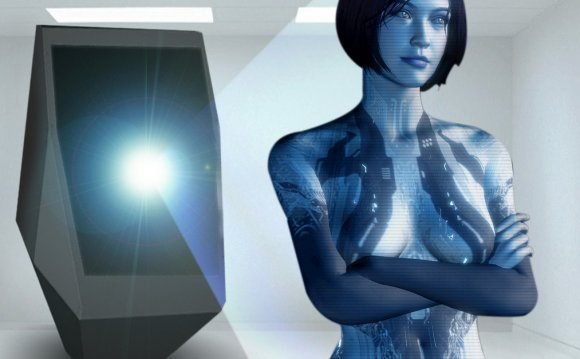
 Mannequins have done their job in store windows for over a century. But as brick-and-mortar stores increasingly fight for attention, they’re due for a digital upgrade. Namely, a talking human hologram that greets you and asks if you’d like to buy the designer sweater she’s wearing. You say yes, and she offers you a coupon you scan on your mobile phone to redeem in-store or online.
Mannequins have done their job in store windows for over a century. But as brick-and-mortar stores increasingly fight for attention, they’re due for a digital upgrade. Namely, a talking human hologram that greets you and asks if you’d like to buy the designer sweater she’s wearing. You say yes, and she offers you a coupon you scan on your mobile phone to redeem in-store or online.
The idea of shopping with a hologram alongside you is not a fantasy. ARHT Media, a startup founded in 2012, has celebrity backers like Larry King and co-founder Paul Anka. The company says its HumaGrams—a patent-pending technology—can be used for digital signage, advertising, convention presentations—and, yes, the aforementioned store display window. ARHT recently partnered with Canadian retail chain Harry Rosen to display a human hologram named "Vincent" during the 2014 holiday shopping season.
 A handful of companies now are creating holographic and augmented reality technologies to engage consumers in more personalized ways. Now that holograms may have been used to resurrect dead musicians like Tupac and Michael Jackson, companies like Ford, Disney, and Guess have used it to promote new products. eBay recently bought PhiSix, a company that develops 3-D models of clothing for virtual dressing rooms.
A handful of companies now are creating holographic and augmented reality technologies to engage consumers in more personalized ways. Now that holograms may have been used to resurrect dead musicians like Tupac and Michael Jackson, companies like Ford, Disney, and Guess have used it to promote new products. eBay recently bought PhiSix, a company that develops 3-D models of clothing for virtual dressing rooms.
Companies are more interested in holograms because they provide valuable data about consumer behavior.
Paul Duffy, the CEO of holographic platform ARHT Media, says holograms aren’t just the latest shiny gadget for companies to dazzle consumers. They’re a necessity if brick and mortars want to compete.
"Everyone is experiencing the proverbial death by a thousand cuts with groups like Amazon in the last several years, " Duffy says. "And it’s only going to continue."
Holograms previously have been too expensive for large scale applications, but experts say that is changing as the tech simultaneously becomes more advanced and cost-effective.
Since their beginnings in the '60s, holograms have had a few commercial incarnations. In 1972, Cartier projected a hologram of a jeweled hand from its Fifth Avenue store window out onto the sidewalk to attract consumers. But today, the technology is still more common in industries outside of retail, such as health care, museums, military, and defense.
RELATED VIDEO











